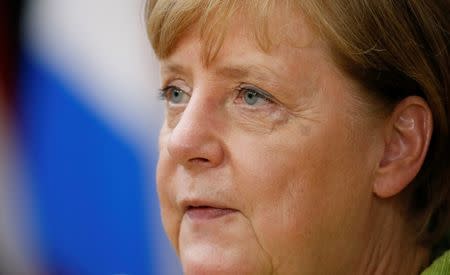Kohl's widow in tug-of-war over unification Chancellor's legacy
By Thomas Escritt BERLIN (Reuters) - Less than a week after Helmut Kohl's death, a row has broken out between his widow, his sons and his political party over the funeral and legacy of the Chancellor who led Germany through the end of the Cold War and reunification. Der Spiegel reported on Thursday that his second wife, Maike Kohl-Richter, had tried to prevent Chancellor Angela Merkel, his one-time protege, from speaking at his memorial service and instead proposed a vocal critic of her, Hungarian Prime Minister Viktor Orban. The young, liberal Orban was mentored by Kohl in the early years after the 1989 collapse of East European Communism, although as prime minister of Hungary he has steered an anti-EU, authoritarian course that many say is at odds with Kohl's legacy. Kohl-Richter has also clashed with his estranged son Walter, who said he was barred from visiting the couple's home to discuss funeral arrangements on Tuesday, a claim denied by his widow's lawyer. The Christian Democrat has been lauded as the statesman who seized the opportunity of collapsing Soviet power in Eastern Europe to win a prize few believed attainable: the reunification of East and West Germany. Next week he becomes the first person to be honoured with a European memorial service for pushing for deeper European integration that led to the birth of the European Union and the common euro currency. But Kohl became increasingly isolated after leaving office in 1998, his legacy tarnished by a party financing scandal involving illegal anonymous donations. He remarried in 2008 after first wife Hannelore's 2001 suicide. Thirty-four years his junior, Kohl-Richter jealously guards his legacy, keeping reams of official papers in their marital home. Kohl also grew estranged from former political allies. Merkel was never forgiven for finally plunging in the knife at the time of the funding scandal. Then the party's General Secretary, she effectively dispatched Kohl with an article in a prominent newspaper in which she said the party must "learn to fight without the old warhorse". Many questioned whether it was really an increasingly frail Kohl who was close to Orban, a nativist critic of Merkel's open-doors refugee policy, whom he received in his Oggersheim home last year when she was under fire for opening Germany's borders to Syrian refugees. Orban has campaigned to "stop Brussels", home to the EU's headquarters, which he has compared to Moscow. Russian troops occupied Hungary for more than 40 years. But he was fulsome in his praise for Kohl's life-work. "His visage is still before me, my dear friend Helmut's valedictory look, as he repeated: 'Europe, Europe'," Orban wrote in a condolence letter to his widow. Kohl-Richter has been talked out of her objections to Merkel. A government spokesman confirmed that Merkel would speak at the Strasbourg memorial service on July 1. (Additional reporting by Gergely Szakacs in Budapest; Editing by Hugh Lawson)

 Yahoo News
Yahoo News 


